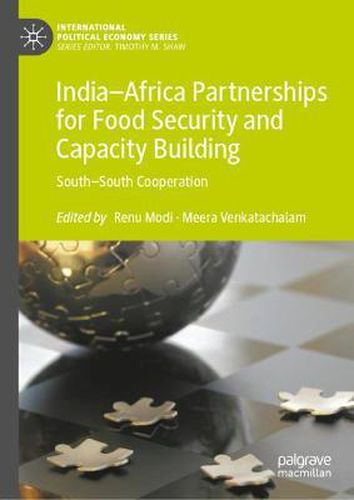Readings Newsletter
Become a Readings Member to make your shopping experience even easier.
Sign in or sign up for free!
You’re not far away from qualifying for FREE standard shipping within Australia
You’ve qualified for FREE standard shipping within Australia
The cart is loading…






This title is printed to order. This book may have been self-published. If so, we cannot guarantee the quality of the content. In the main most books will have gone through the editing process however some may not. We therefore suggest that you be aware of this before ordering this book. If in doubt check either the author or publisher’s details as we are unable to accept any returns unless they are faulty. Please contact us if you have any questions.
This compendium showcases the ongoing trends and challenges in South-South cooperation between India and select countries in Africa, for achieving food security and poverty reduction. Scholars and practitioners share diverse perspectives on the role of India’s development compact; aid, trade, private sector driven Foreign Direct Investments (FDIs), and concessional Lines of Credit (LOCs) to the agricultural and agro-processing sector in Africa. India- Africa cooperation also underscores that the sharing of knowledge and capabilities- technical and financial, along with North- South partnerships- through trilateral and multilateral mechanisms, can upscale agriculture and agro-processing sectors to centre stage the food security agenda and reduce poverty. Arguments made through the volume critically highlight hegemonic neo-liberal economic policies, structural adjustment programmes, import substitution practices, and the denationalization of food production, and illustrate the need for sustainable and cost effective agro-ecological practices, in the face of ongoing global challenges, such as the climate emergency and degradation of biodiversity and habitats.
The axial questions addressed are; how does cooperation between countries of the Global South- India and Africa - impact intra-South trading, capacity building, and the investment landscape. Scientists, academics, development professionals, government officials, NGOs and international organizations, offer the readers; empirical case studies, policy perspectives, the limitations and challenges, and the way forward in an analytical manner.
$9.00 standard shipping within Australia
FREE standard shipping within Australia for orders over $100.00
Express & International shipping calculated at checkout
This title is printed to order. This book may have been self-published. If so, we cannot guarantee the quality of the content. In the main most books will have gone through the editing process however some may not. We therefore suggest that you be aware of this before ordering this book. If in doubt check either the author or publisher’s details as we are unable to accept any returns unless they are faulty. Please contact us if you have any questions.
This compendium showcases the ongoing trends and challenges in South-South cooperation between India and select countries in Africa, for achieving food security and poverty reduction. Scholars and practitioners share diverse perspectives on the role of India’s development compact; aid, trade, private sector driven Foreign Direct Investments (FDIs), and concessional Lines of Credit (LOCs) to the agricultural and agro-processing sector in Africa. India- Africa cooperation also underscores that the sharing of knowledge and capabilities- technical and financial, along with North- South partnerships- through trilateral and multilateral mechanisms, can upscale agriculture and agro-processing sectors to centre stage the food security agenda and reduce poverty. Arguments made through the volume critically highlight hegemonic neo-liberal economic policies, structural adjustment programmes, import substitution practices, and the denationalization of food production, and illustrate the need for sustainable and cost effective agro-ecological practices, in the face of ongoing global challenges, such as the climate emergency and degradation of biodiversity and habitats.
The axial questions addressed are; how does cooperation between countries of the Global South- India and Africa - impact intra-South trading, capacity building, and the investment landscape. Scientists, academics, development professionals, government officials, NGOs and international organizations, offer the readers; empirical case studies, policy perspectives, the limitations and challenges, and the way forward in an analytical manner.